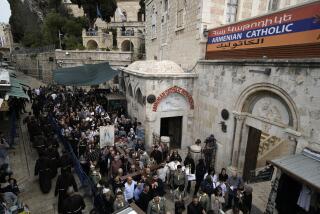Killing of Minority Christians Underlines Societal Tensions
- Share via
EL KUSHEH, Egypt — It began with an argument in the marketplace between a Christian shopkeeper and a Muslim vendor. Before it was over three days later, 21 people had been killed--all but one of them Coptic Christian--in the worst case of sectarian violence in Egypt in at least three decades.
The killings Sunday and Monday left this mainly Christian Nile Valley town of 25,000 people about 260 miles south of Cairo damaged and in shock.
The two religious communities stare sullenly at each other, filled with suspicion and fear. In a scene reminiscent of Northern Ireland, police officers wearing helmets and body armor walk the empty lanes at night, seeking to supply an elusive sense of security.
In the aftermath of the violence, El Kusheh seemed almost a ghost town, its market still littered with broken stalls and other debris.
Except for the grim-faced police, the only signs of life were one Muslim-owned shop open and a few Christians walking furtively to Christmas services, observed here Jan. 6.
“The government has no one to blame but themselves” for the violence, said Milad Hanna, a prominent Coptic journalist and former member of parliament. Egypt still has not done enough to ensure the security and status of Christians, he said, even though they make up at least 10% of the population and have lived in Egypt since the days of the apostles.
He and other Copts accuse officials of failing to confront sectarian strife and take steps to convince Muslims that Christians are a legitimate part of society.
The Christian community, made up mostly of 6 million to 10 million Copts, is the largest in the Middle East and a key to determining whether the faithful hang on in any meaningful numbers in the region. So far, there is no sign that the violence in remote El Kusheh has set off a general panic in the Coptic community at large.
The situation of Christians in Egypt is not one of widespread, official persecution. Indeed, the government professes religious tolerance, and in most areas Coptic Christians worship and live freely next to Muslim neighbors.
But Islam is the state-supported religion, and insensitivity to Copts’ religious and cultural rights can be seen in the difficulty they face obtaining permission to build new churches and in the Muslim community’s penchant for putting up a mosque near existing churches.
Coptic spokesmen complain that their religion and history get short shrift on television and in school curricula. Not one Christian is a provincial governor, they note, and the ruling party did not include a Copt on its last parliament slate.
All this creates tension. In a primitive and poor backwater like El Kusheh, economic and social friction--fanned by extremists--occasionally flares into violence.
The Egyptian Organization for Human Rights has documented four cases of sectarian fighting since 1972, of which this week’s outbreak in El Kusheh was the worst.
In El Kusheh, according to Egyptian journalist Mohammed Salah, Muslims apparently felt that the Copts were getting uppity, so it was time to “knock them down hard.” The town’s Christians garnered international attention in 1998 when they complained that scores of Copts were arrested and tortured during a murder investigation.
There are differing accounts of the quarrel Dec. 31. But according to police Gen. Mohammed Shaarawi, the head of general security for the country, it led to a general rock-throwing melee in which Muslims set fire to Christian shops, and Christians knocked over wooden stalls used by Muslim vendors.
Police thought that they had brokered a truce, but shooting and killing erupted Sunday and continued Monday after rumors (at that time untrue) that either a Christian or a Muslim had been killed and that the Christians were preparing to poison the town’s water.
Muslims fired from rooftops at Christians and in some cases killed victims in their houses or fields, said Victor Meshraki, a Christian.
Shaarawi said at least 36 arrests have been made and calm has been restored. But Meshraki doubts that the problems will be solved unless the authorities show more firmness.
“Those agitating and provoking these people need to be rounded up and punished harshly,” he said, “so that others will not imitate them.”
More to Read
Sign up for Essential California
The most important California stories and recommendations in your inbox every morning.
You may occasionally receive promotional content from the Los Angeles Times.













